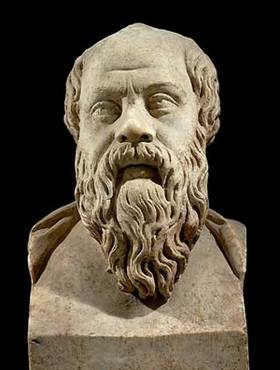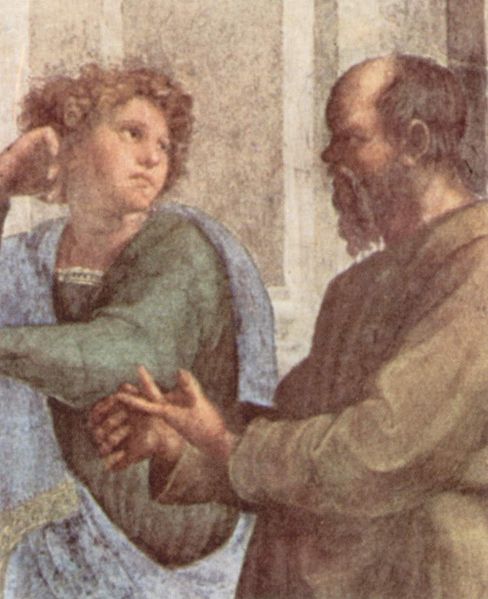Wise Socrates

The hero of this publication will be the greatest philosopher of ancient Greece, Socrates is well known to all. And it be known that his sharp mind (or language) belongs to a considerable number of winged phrases and aphorisms are cited here for centuries. Socrates was wise enough not even afraid to honestly admit that he did not know (I know that I know nothing), and this is its greatest wisdom. And he’s one of the few people who were really sincere and honest, both with regard to themselves and to others.
Socrates was born about 469 BC in Athens. His father was a philosopher, a simple bricklayer and his mother a midwife (midwife – a woman, a professional caregiver, since maternity hospitals in those days was not yet). His childhood and youth, little is known, only know that the young Socrates has received a broad education (as he was well aware of many things). And in adolescence Socrates served in the Athenian army and even participated as a simple infantryman in Pelepones war with Sparta.
Stories became known as Socrates already in middle age, when there is its emergence as a great sage and philosopher. Generally during the period in cultural Athens divorced many disparate “philosopher” – fans scratching languages on a variety of “high spiritual matters.” Since the use of their chatter, there was no such ” philosopher ” ordinary Athenians called “sophists”, that our Greek can be translated as “clever”. These clever, instead of doing something useful all the time spent at the Athens Forum in aimless chatter 1 and debates, competing to see who argue. And then in the arena of cultural philosophy of life comes Socrates.
His philosophical career he began with the fact that the Athens Forum is easy to argue with all there the inhabitants, it is logical to proving the absurdity of sophists of philosophical ideas, showing them all of their ignorance, veiled behind high-sounding words. The final course it did not like, and some even began to think like Socrates to announce a ban. But there were also those who enthusiastically admired sharp wit and interesting thoughts of Socrates. The most famous and the most devoted disciple of the philosopher Plato began. He carefully recorded and Socrates his comments and thoughts, thanks to Plato, Socrates, we know what we know (“and then we do not know” – said to Socrates)
His philosophical teaching and reflection Socrates often compared with the art of childbirth, only instead of little children are born new thoughts and ideas. And he called himself midwife who takes birth of new ideas. (His mother was a midwife present). Art childbirth in Greek is called maevtika later this word began to understand the teachings of Socrates. Maevtika Socrates was a dialogue in which Socrates asked his interlocutor various tricky questions to answer that, willy-nilly had to include brains. (Today, this method is based on the variety of psychotherapeutic techniques, and most importantly skills of psychologists and psychotherapists – to be able to ask the right questions to his client-patient)
In general, Socrates was not so much a philosopher and mystic. He did not claim the laurels of the sage, but rather emphasized their ignorance, which did not hesitate. A big mistake many people is that they think if something know. Socrates even know that he knew nothing. And interestingly enough, Socrates anyone with their issues could prove that she, too, does not know anything. (This is not to everyone)
Socrates belongs to a large number of very wise catch phrase, here are some of them: “Know yourself – know God” (built on this whole psychology). “In a dispute born truth.” “I know that I know nothing.” “The less a person needs, so it is closer to God” (How does this much in common with the noble truths of Buddhism). Said Socrates loved to walk through the market, and not buying anything when he was asked: “Why?” He answered: “How wonderful to see so many things without which I can do”

Socrates, the famous fresco by Raphael “The School of Athens.”
Special attention should be paid to married life of Socrates. As we know, he was married to a woman named grumpy Xanthippus that constantly arranges for him to family scandals and was continually nagged her husband. One day later, Socrates went home angry Xanthippe first shouted at him, and then poured it on his head a pitcher of water. What philosopher said quietly: “My Xanthippus as bad weather, first let the thunder and lightning, and then the rain.”
Socrates was a great sense of humor. One young boy asked Socrates: – Should I get married? – Do what you want, you still regret it. – Socrates replied.
And about married life, he said this: “Marry it is necessary, because if you have a good and affectionate wife – you’ll be happy. But if you have a wife, angry and quarrelsome (like me) then you will certainly become philosophers (like me) and also will be happy. “
In Athens, Socrates had many enemies (which is understandable), which are very like his ban on the forum and in the end they succeeded. Three of the Sophists Socrates was accused that he corrupts the youth does not respect the gods and the laws of Athens, dishonors public morality. (This same wine Socrates was only that he issues his Dialogue showed their ignorance of the people, denounced the many sins and vices, and who like to be a reproof?). The court found Socrates guilty and first as a punishment decided philosopher ever leave Athens. But Socrates refused to leave his native city. The court ruled the death penalty through poisoning. According to legend, shortly before the date of execution, security Athens prison deliberately “forgot” to close the chamber in which Socrates was sitting, he could easily escape. But the philosopher chose death rather than expulsion. When his friends asked why he did not run away, he replied: “Do you think that in Greece there is a place where death will not find me?”
A sense of humor did not leave until the last moments of Socrates’ life. When Xanthippe tears came to his cell with the words “You are killing the innocent!” Socrates replied: “And you wanted to justly?”
Before his death, Socrates heard another prisoner very cool recites a beautiful poem. Socrates began to persuade him to teach him the poem. – Why do you need it, – the prisoner was surprised – you have the same tomorrow so be executed? – What’s the difference – learn something new over seventy years before his death, or the day before his death? – Socrates replied.

This painting depicts the slow death of Socrates by poison hemlock. Until his last breath, Socrates continued to communicate with his disciples, parallel fixing all bodily sensations that are happening to him under the influence of poison. Socrates accepted death calmly and deliberately, as befits a true philosopher, and his sayings more than one century will be quoted by different people.